Sharing Economy and Tourism: Analyzing Accommodation & Hospitality
VerifiedAdded on 2023/06/14
|13
|3666
|294
Essay
AI Summary
This essay provides an analysis of the sharing economy and its impact on the tourism and hospitality industries, with a particular focus on accommodation. It discusses the benefits that motivate tourists to use the sharing economy, such as lower costs, social interaction, and cultural experiences. The essay also explores the profile of people who stay in shared accommodations, international trends in the market, and the hospitality experience offered by the sharing economy. It debates whether sharing accommodation provides an authentic or commercialized experience and examines how the sharing economy redefines traditional hospitality. Furthermore, the essay identifies which types of hotels are most affected by the sharing economy, using the example of a three-star hotel in Adelaide CBD, and suggests strategies for traditional hotels to respond to this phenomenon. The rise of platforms like Airbnb and their influence on the hotel industry are central themes throughout the analysis.
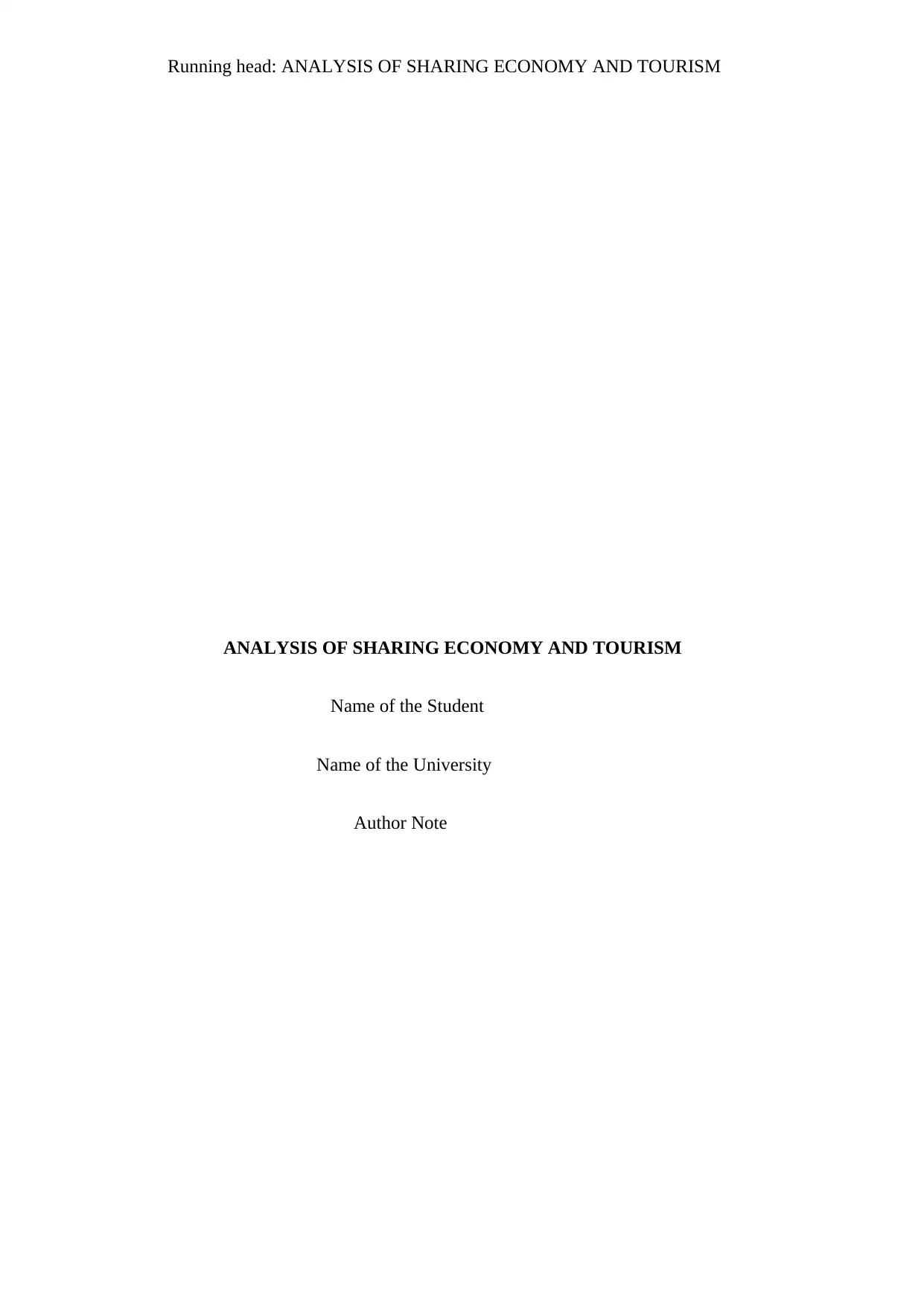
Running head: ANALYSIS OF SHARING ECONOMY AND TOURISM
ANALYSIS OF SHARING ECONOMY AND TOURISM
Name of the Student
Name of the University
Author Note
ANALYSIS OF SHARING ECONOMY AND TOURISM
Name of the Student
Name of the University
Author Note
Paraphrase This Document
Need a fresh take? Get an instant paraphrase of this document with our AI Paraphraser
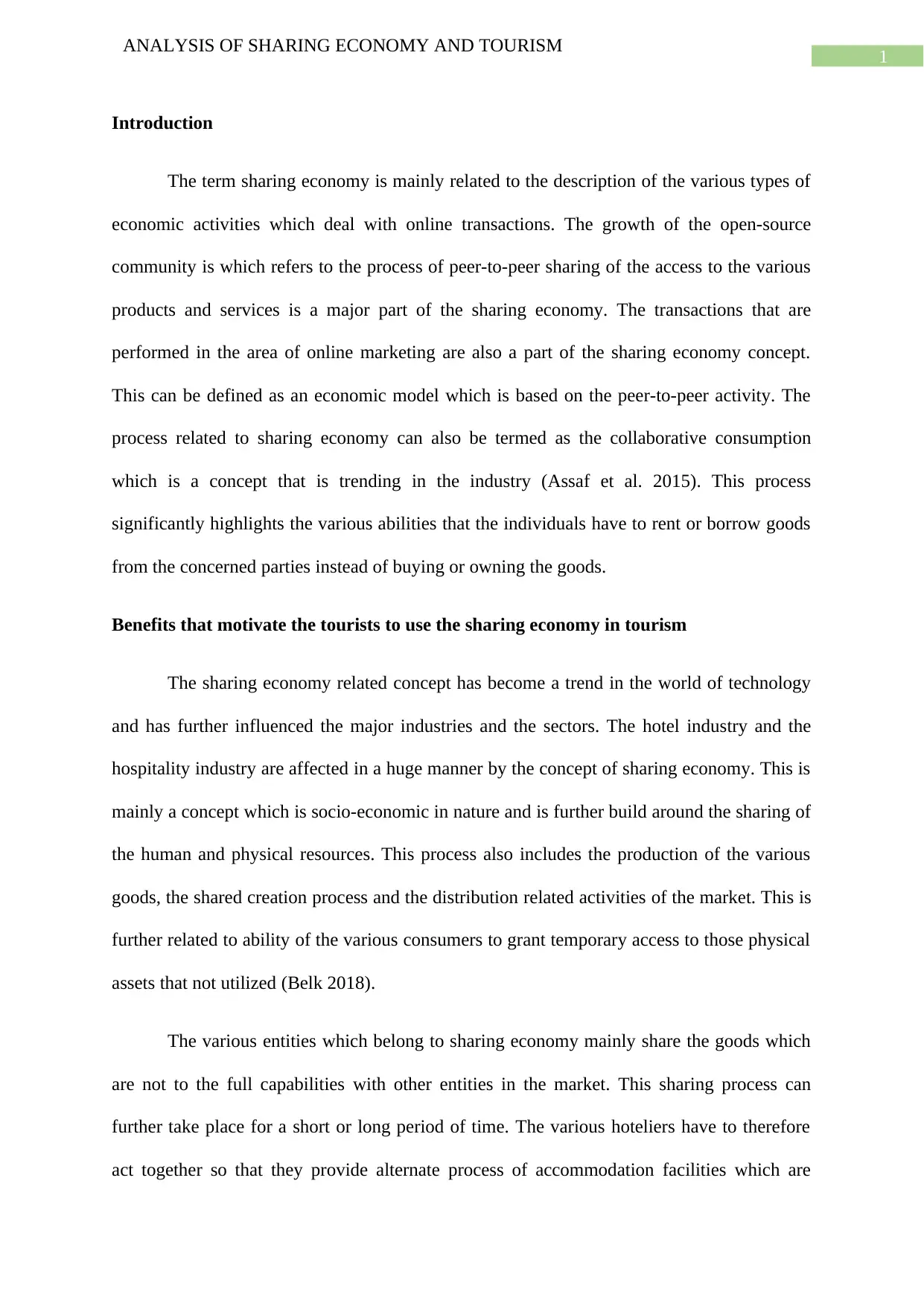
1
ANALYSIS OF SHARING ECONOMY AND TOURISM
Introduction
The term sharing economy is mainly related to the description of the various types of
economic activities which deal with online transactions. The growth of the open-source
community is which refers to the process of peer-to-peer sharing of the access to the various
products and services is a major part of the sharing economy. The transactions that are
performed in the area of online marketing are also a part of the sharing economy concept.
This can be defined as an economic model which is based on the peer-to-peer activity. The
process related to sharing economy can also be termed as the collaborative consumption
which is a concept that is trending in the industry (Assaf et al. 2015). This process
significantly highlights the various abilities that the individuals have to rent or borrow goods
from the concerned parties instead of buying or owning the goods.
Benefits that motivate the tourists to use the sharing economy in tourism
The sharing economy related concept has become a trend in the world of technology
and has further influenced the major industries and the sectors. The hotel industry and the
hospitality industry are affected in a huge manner by the concept of sharing economy. This is
mainly a concept which is socio-economic in nature and is further build around the sharing of
the human and physical resources. This process also includes the production of the various
goods, the shared creation process and the distribution related activities of the market. This is
further related to ability of the various consumers to grant temporary access to those physical
assets that not utilized (Belk 2018).
The various entities which belong to sharing economy mainly share the goods which
are not to the full capabilities with other entities in the market. This sharing process can
further take place for a short or long period of time. The various hoteliers have to therefore
act together so that they provide alternate process of accommodation facilities which are
ANALYSIS OF SHARING ECONOMY AND TOURISM
Introduction
The term sharing economy is mainly related to the description of the various types of
economic activities which deal with online transactions. The growth of the open-source
community is which refers to the process of peer-to-peer sharing of the access to the various
products and services is a major part of the sharing economy. The transactions that are
performed in the area of online marketing are also a part of the sharing economy concept.
This can be defined as an economic model which is based on the peer-to-peer activity. The
process related to sharing economy can also be termed as the collaborative consumption
which is a concept that is trending in the industry (Assaf et al. 2015). This process
significantly highlights the various abilities that the individuals have to rent or borrow goods
from the concerned parties instead of buying or owning the goods.
Benefits that motivate the tourists to use the sharing economy in tourism
The sharing economy related concept has become a trend in the world of technology
and has further influenced the major industries and the sectors. The hotel industry and the
hospitality industry are affected in a huge manner by the concept of sharing economy. This is
mainly a concept which is socio-economic in nature and is further build around the sharing of
the human and physical resources. This process also includes the production of the various
goods, the shared creation process and the distribution related activities of the market. This is
further related to ability of the various consumers to grant temporary access to those physical
assets that not utilized (Belk 2018).
The various entities which belong to sharing economy mainly share the goods which
are not to the full capabilities with other entities in the market. This sharing process can
further take place for a short or long period of time. The various hoteliers have to therefore
act together so that they provide alternate process of accommodation facilities which are
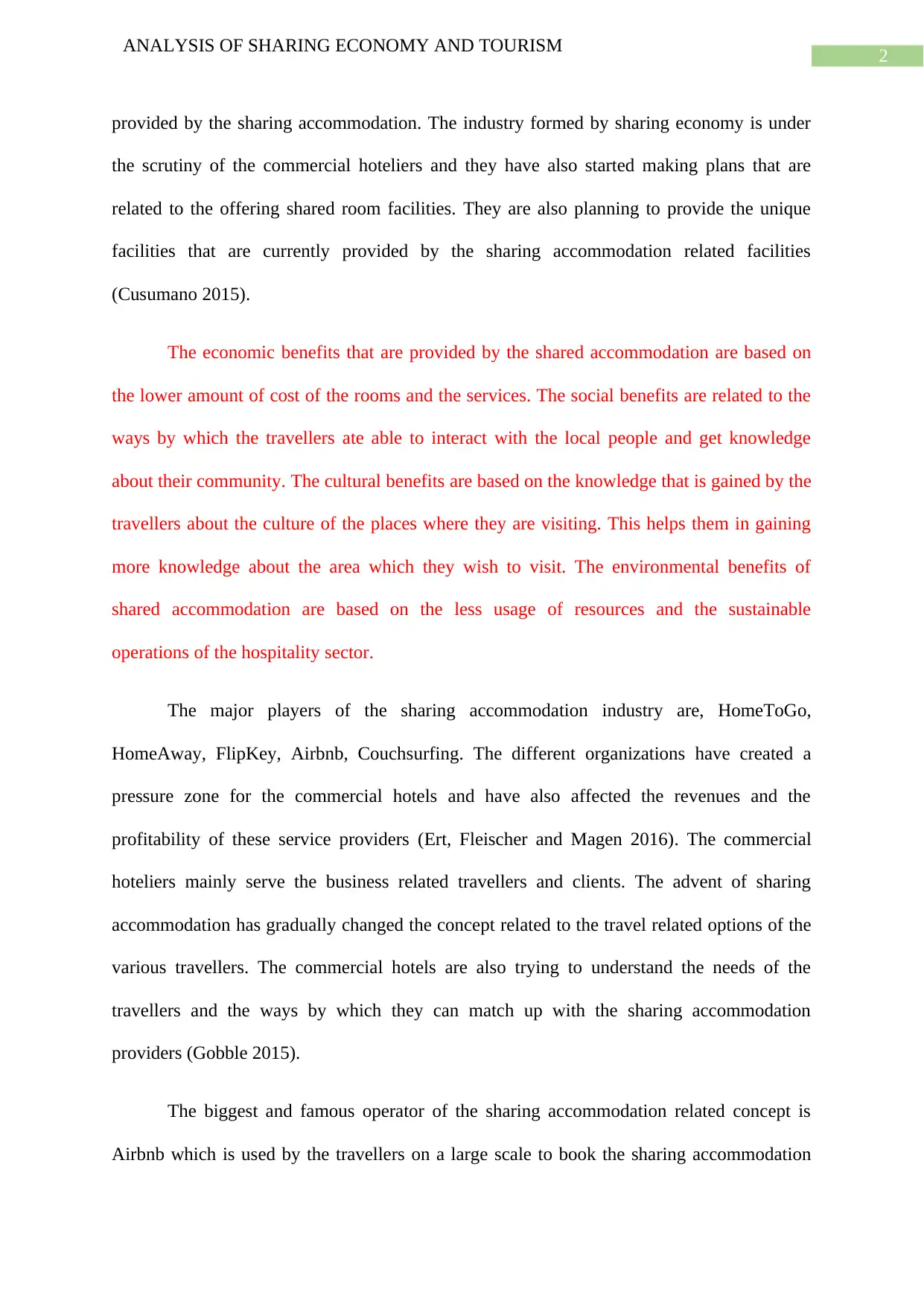
2
ANALYSIS OF SHARING ECONOMY AND TOURISM
provided by the sharing accommodation. The industry formed by sharing economy is under
the scrutiny of the commercial hoteliers and they have also started making plans that are
related to the offering shared room facilities. They are also planning to provide the unique
facilities that are currently provided by the sharing accommodation related facilities
(Cusumano 2015).
The economic benefits that are provided by the shared accommodation are based on
the lower amount of cost of the rooms and the services. The social benefits are related to the
ways by which the travellers ate able to interact with the local people and get knowledge
about their community. The cultural benefits are based on the knowledge that is gained by the
travellers about the culture of the places where they are visiting. This helps them in gaining
more knowledge about the area which they wish to visit. The environmental benefits of
shared accommodation are based on the less usage of resources and the sustainable
operations of the hospitality sector.
The major players of the sharing accommodation industry are, HomeToGo,
HomeAway, FlipKey, Airbnb, Couchsurfing. The different organizations have created a
pressure zone for the commercial hotels and have also affected the revenues and the
profitability of these service providers (Ert, Fleischer and Magen 2016). The commercial
hoteliers mainly serve the business related travellers and clients. The advent of sharing
accommodation has gradually changed the concept related to the travel related options of the
various travellers. The commercial hotels are also trying to understand the needs of the
travellers and the ways by which they can match up with the sharing accommodation
providers (Gobble 2015).
The biggest and famous operator of the sharing accommodation related concept is
Airbnb which is used by the travellers on a large scale to book the sharing accommodation
ANALYSIS OF SHARING ECONOMY AND TOURISM
provided by the sharing accommodation. The industry formed by sharing economy is under
the scrutiny of the commercial hoteliers and they have also started making plans that are
related to the offering shared room facilities. They are also planning to provide the unique
facilities that are currently provided by the sharing accommodation related facilities
(Cusumano 2015).
The economic benefits that are provided by the shared accommodation are based on
the lower amount of cost of the rooms and the services. The social benefits are related to the
ways by which the travellers ate able to interact with the local people and get knowledge
about their community. The cultural benefits are based on the knowledge that is gained by the
travellers about the culture of the places where they are visiting. This helps them in gaining
more knowledge about the area which they wish to visit. The environmental benefits of
shared accommodation are based on the less usage of resources and the sustainable
operations of the hospitality sector.
The major players of the sharing accommodation industry are, HomeToGo,
HomeAway, FlipKey, Airbnb, Couchsurfing. The different organizations have created a
pressure zone for the commercial hotels and have also affected the revenues and the
profitability of these service providers (Ert, Fleischer and Magen 2016). The commercial
hoteliers mainly serve the business related travellers and clients. The advent of sharing
accommodation has gradually changed the concept related to the travel related options of the
various travellers. The commercial hotels are also trying to understand the needs of the
travellers and the ways by which they can match up with the sharing accommodation
providers (Gobble 2015).
The biggest and famous operator of the sharing accommodation related concept is
Airbnb which is used by the travellers on a large scale to book the sharing accommodation
⊘ This is a preview!⊘
Do you want full access?
Subscribe today to unlock all pages.

Trusted by 1+ million students worldwide
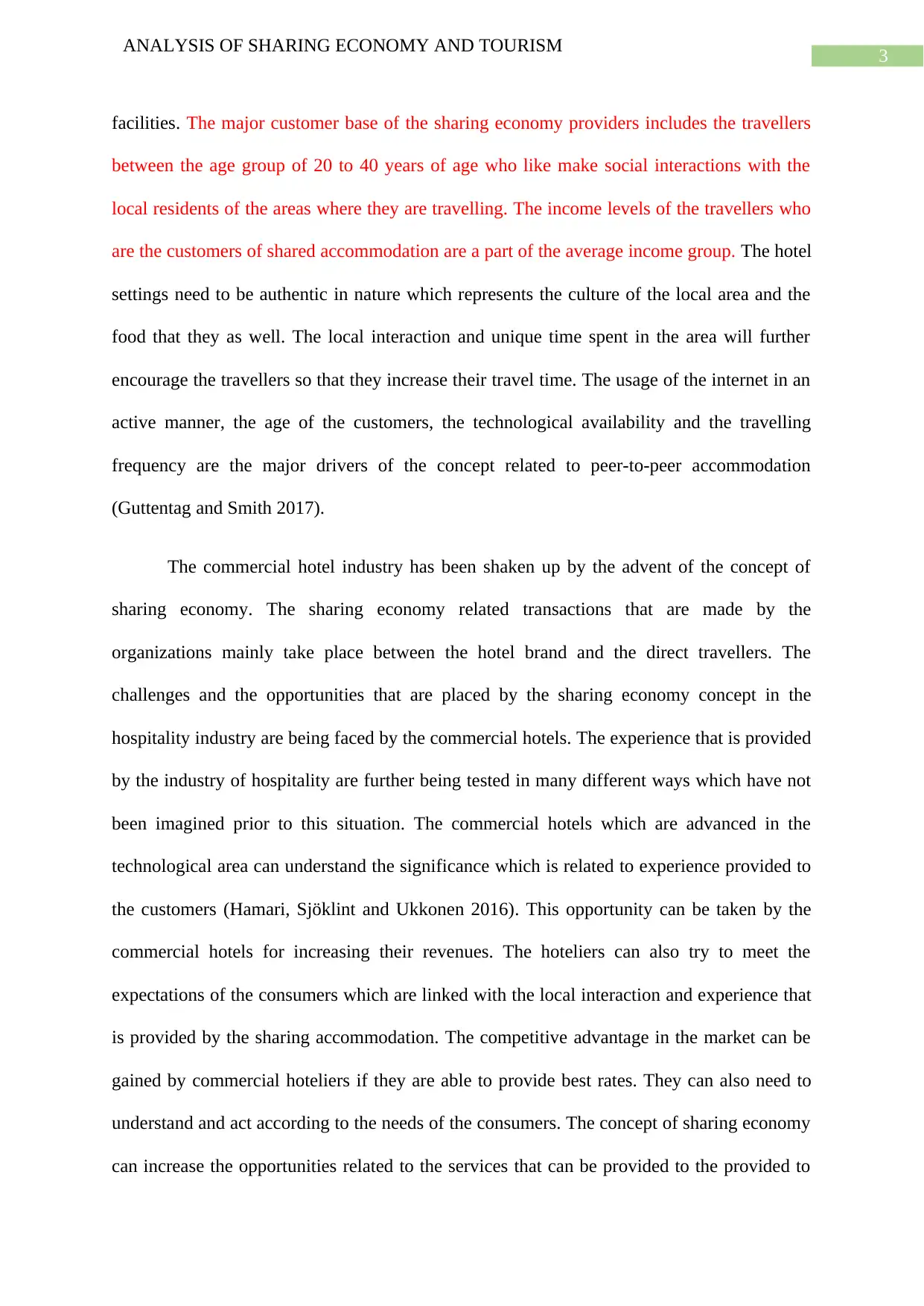
3
ANALYSIS OF SHARING ECONOMY AND TOURISM
facilities. The major customer base of the sharing economy providers includes the travellers
between the age group of 20 to 40 years of age who like make social interactions with the
local residents of the areas where they are travelling. The income levels of the travellers who
are the customers of shared accommodation are a part of the average income group. The hotel
settings need to be authentic in nature which represents the culture of the local area and the
food that they as well. The local interaction and unique time spent in the area will further
encourage the travellers so that they increase their travel time. The usage of the internet in an
active manner, the age of the customers, the technological availability and the travelling
frequency are the major drivers of the concept related to peer-to-peer accommodation
(Guttentag and Smith 2017).
The commercial hotel industry has been shaken up by the advent of the concept of
sharing economy. The sharing economy related transactions that are made by the
organizations mainly take place between the hotel brand and the direct travellers. The
challenges and the opportunities that are placed by the sharing economy concept in the
hospitality industry are being faced by the commercial hotels. The experience that is provided
by the industry of hospitality are further being tested in many different ways which have not
been imagined prior to this situation. The commercial hotels which are advanced in the
technological area can understand the significance which is related to experience provided to
the customers (Hamari, Sjöklint and Ukkonen 2016). This opportunity can be taken by the
commercial hotels for increasing their revenues. The hoteliers can also try to meet the
expectations of the consumers which are linked with the local interaction and experience that
is provided by the sharing accommodation. The competitive advantage in the market can be
gained by commercial hoteliers if they are able to provide best rates. They can also need to
understand and act according to the needs of the consumers. The concept of sharing economy
can increase the opportunities related to the services that can be provided to the provided to
ANALYSIS OF SHARING ECONOMY AND TOURISM
facilities. The major customer base of the sharing economy providers includes the travellers
between the age group of 20 to 40 years of age who like make social interactions with the
local residents of the areas where they are travelling. The income levels of the travellers who
are the customers of shared accommodation are a part of the average income group. The hotel
settings need to be authentic in nature which represents the culture of the local area and the
food that they as well. The local interaction and unique time spent in the area will further
encourage the travellers so that they increase their travel time. The usage of the internet in an
active manner, the age of the customers, the technological availability and the travelling
frequency are the major drivers of the concept related to peer-to-peer accommodation
(Guttentag and Smith 2017).
The commercial hotel industry has been shaken up by the advent of the concept of
sharing economy. The sharing economy related transactions that are made by the
organizations mainly take place between the hotel brand and the direct travellers. The
challenges and the opportunities that are placed by the sharing economy concept in the
hospitality industry are being faced by the commercial hotels. The experience that is provided
by the industry of hospitality are further being tested in many different ways which have not
been imagined prior to this situation. The commercial hotels which are advanced in the
technological area can understand the significance which is related to experience provided to
the customers (Hamari, Sjöklint and Ukkonen 2016). This opportunity can be taken by the
commercial hotels for increasing their revenues. The hoteliers can also try to meet the
expectations of the consumers which are linked with the local interaction and experience that
is provided by the sharing accommodation. The competitive advantage in the market can be
gained by commercial hoteliers if they are able to provide best rates. They can also need to
understand and act according to the needs of the consumers. The concept of sharing economy
can increase the opportunities related to the services that can be provided to the provided to
Paraphrase This Document
Need a fresh take? Get an instant paraphrase of this document with our AI Paraphraser
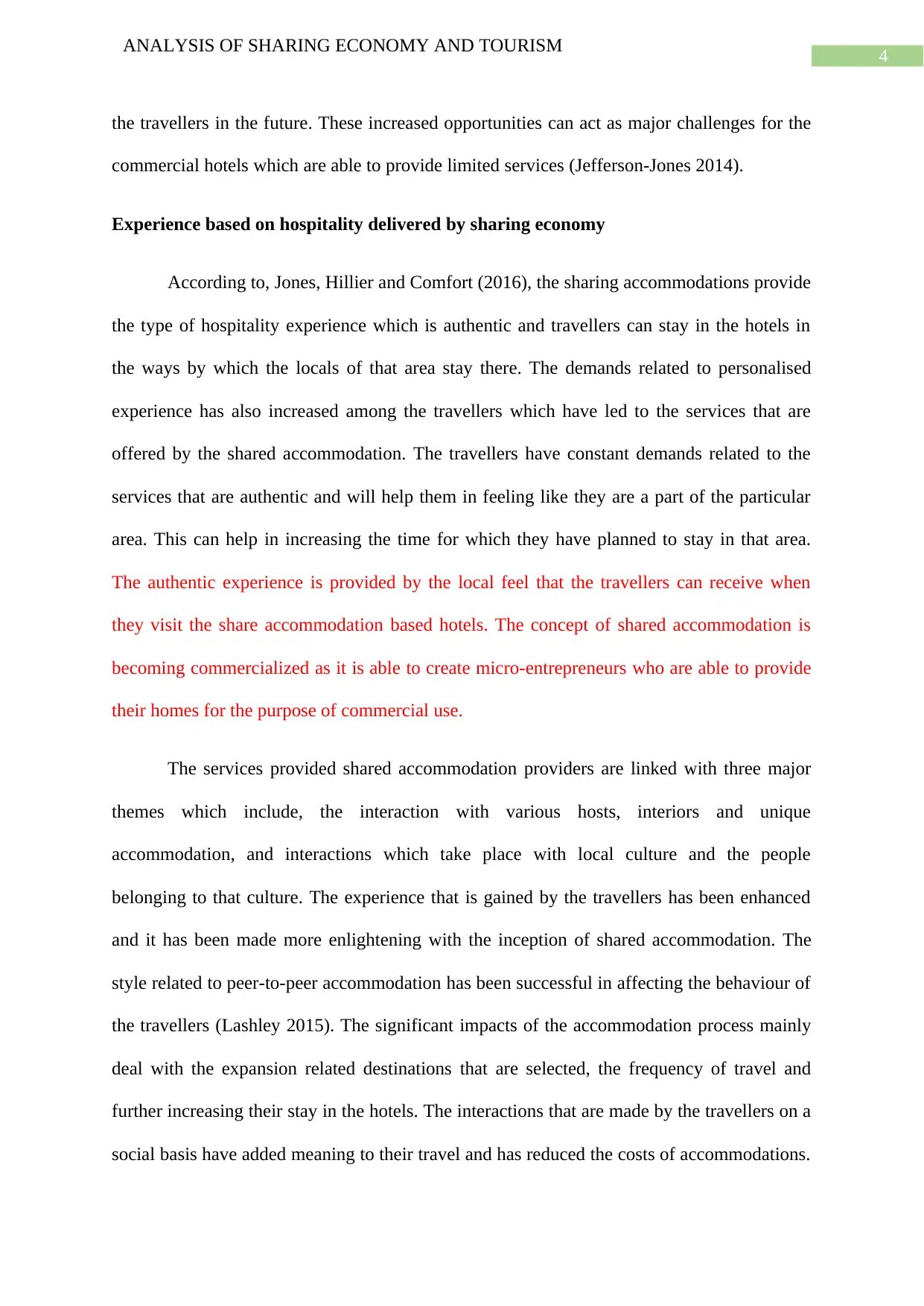
4
ANALYSIS OF SHARING ECONOMY AND TOURISM
the travellers in the future. These increased opportunities can act as major challenges for the
commercial hotels which are able to provide limited services (Jefferson-Jones 2014).
Experience based on hospitality delivered by sharing economy
According to, Jones, Hillier and Comfort (2016), the sharing accommodations provide
the type of hospitality experience which is authentic and travellers can stay in the hotels in
the ways by which the locals of that area stay there. The demands related to personalised
experience has also increased among the travellers which have led to the services that are
offered by the shared accommodation. The travellers have constant demands related to the
services that are authentic and will help them in feeling like they are a part of the particular
area. This can help in increasing the time for which they have planned to stay in that area.
The authentic experience is provided by the local feel that the travellers can receive when
they visit the share accommodation based hotels. The concept of shared accommodation is
becoming commercialized as it is able to create micro-entrepreneurs who are able to provide
their homes for the purpose of commercial use.
The services provided shared accommodation providers are linked with three major
themes which include, the interaction with various hosts, interiors and unique
accommodation, and interactions which take place with local culture and the people
belonging to that culture. The experience that is gained by the travellers has been enhanced
and it has been made more enlightening with the inception of shared accommodation. The
style related to peer-to-peer accommodation has been successful in affecting the behaviour of
the travellers (Lashley 2015). The significant impacts of the accommodation process mainly
deal with the expansion related destinations that are selected, the frequency of travel and
further increasing their stay in the hotels. The interactions that are made by the travellers on a
social basis have added meaning to their travel and has reduced the costs of accommodations.
ANALYSIS OF SHARING ECONOMY AND TOURISM
the travellers in the future. These increased opportunities can act as major challenges for the
commercial hotels which are able to provide limited services (Jefferson-Jones 2014).
Experience based on hospitality delivered by sharing economy
According to, Jones, Hillier and Comfort (2016), the sharing accommodations provide
the type of hospitality experience which is authentic and travellers can stay in the hotels in
the ways by which the locals of that area stay there. The demands related to personalised
experience has also increased among the travellers which have led to the services that are
offered by the shared accommodation. The travellers have constant demands related to the
services that are authentic and will help them in feeling like they are a part of the particular
area. This can help in increasing the time for which they have planned to stay in that area.
The authentic experience is provided by the local feel that the travellers can receive when
they visit the share accommodation based hotels. The concept of shared accommodation is
becoming commercialized as it is able to create micro-entrepreneurs who are able to provide
their homes for the purpose of commercial use.
The services provided shared accommodation providers are linked with three major
themes which include, the interaction with various hosts, interiors and unique
accommodation, and interactions which take place with local culture and the people
belonging to that culture. The experience that is gained by the travellers has been enhanced
and it has been made more enlightening with the inception of shared accommodation. The
style related to peer-to-peer accommodation has been successful in affecting the behaviour of
the travellers (Lashley 2015). The significant impacts of the accommodation process mainly
deal with the expansion related destinations that are selected, the frequency of travel and
further increasing their stay in the hotels. The interactions that are made by the travellers on a
social basis have added meaning to their travel and has reduced the costs of accommodations.
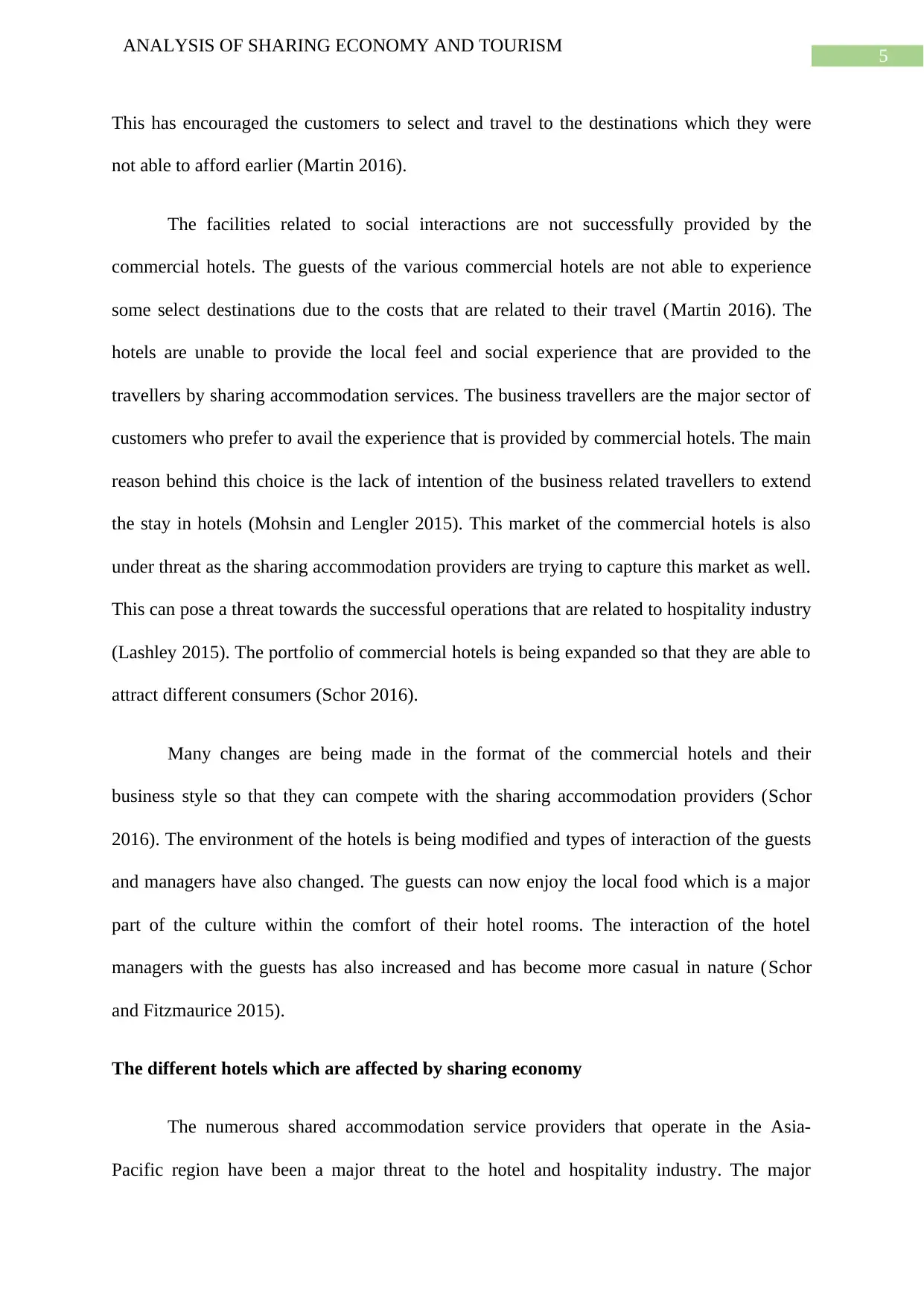
5
ANALYSIS OF SHARING ECONOMY AND TOURISM
This has encouraged the customers to select and travel to the destinations which they were
not able to afford earlier (Martin 2016).
The facilities related to social interactions are not successfully provided by the
commercial hotels. The guests of the various commercial hotels are not able to experience
some select destinations due to the costs that are related to their travel (Martin 2016). The
hotels are unable to provide the local feel and social experience that are provided to the
travellers by sharing accommodation services. The business travellers are the major sector of
customers who prefer to avail the experience that is provided by commercial hotels. The main
reason behind this choice is the lack of intention of the business related travellers to extend
the stay in hotels (Mohsin and Lengler 2015). This market of the commercial hotels is also
under threat as the sharing accommodation providers are trying to capture this market as well.
This can pose a threat towards the successful operations that are related to hospitality industry
(Lashley 2015). The portfolio of commercial hotels is being expanded so that they are able to
attract different consumers (Schor 2016).
Many changes are being made in the format of the commercial hotels and their
business style so that they can compete with the sharing accommodation providers (Schor
2016). The environment of the hotels is being modified and types of interaction of the guests
and managers have also changed. The guests can now enjoy the local food which is a major
part of the culture within the comfort of their hotel rooms. The interaction of the hotel
managers with the guests has also increased and has become more casual in nature (Schor
and Fitzmaurice 2015).
The different hotels which are affected by sharing economy
The numerous shared accommodation service providers that operate in the Asia-
Pacific region have been a major threat to the hotel and hospitality industry. The major
ANALYSIS OF SHARING ECONOMY AND TOURISM
This has encouraged the customers to select and travel to the destinations which they were
not able to afford earlier (Martin 2016).
The facilities related to social interactions are not successfully provided by the
commercial hotels. The guests of the various commercial hotels are not able to experience
some select destinations due to the costs that are related to their travel (Martin 2016). The
hotels are unable to provide the local feel and social experience that are provided to the
travellers by sharing accommodation services. The business travellers are the major sector of
customers who prefer to avail the experience that is provided by commercial hotels. The main
reason behind this choice is the lack of intention of the business related travellers to extend
the stay in hotels (Mohsin and Lengler 2015). This market of the commercial hotels is also
under threat as the sharing accommodation providers are trying to capture this market as well.
This can pose a threat towards the successful operations that are related to hospitality industry
(Lashley 2015). The portfolio of commercial hotels is being expanded so that they are able to
attract different consumers (Schor 2016).
Many changes are being made in the format of the commercial hotels and their
business style so that they can compete with the sharing accommodation providers (Schor
2016). The environment of the hotels is being modified and types of interaction of the guests
and managers have also changed. The guests can now enjoy the local food which is a major
part of the culture within the comfort of their hotel rooms. The interaction of the hotel
managers with the guests has also increased and has become more casual in nature (Schor
and Fitzmaurice 2015).
The different hotels which are affected by sharing economy
The numerous shared accommodation service providers that operate in the Asia-
Pacific region have been a major threat to the hotel and hospitality industry. The major
⊘ This is a preview!⊘
Do you want full access?
Subscribe today to unlock all pages.

Trusted by 1+ million students worldwide
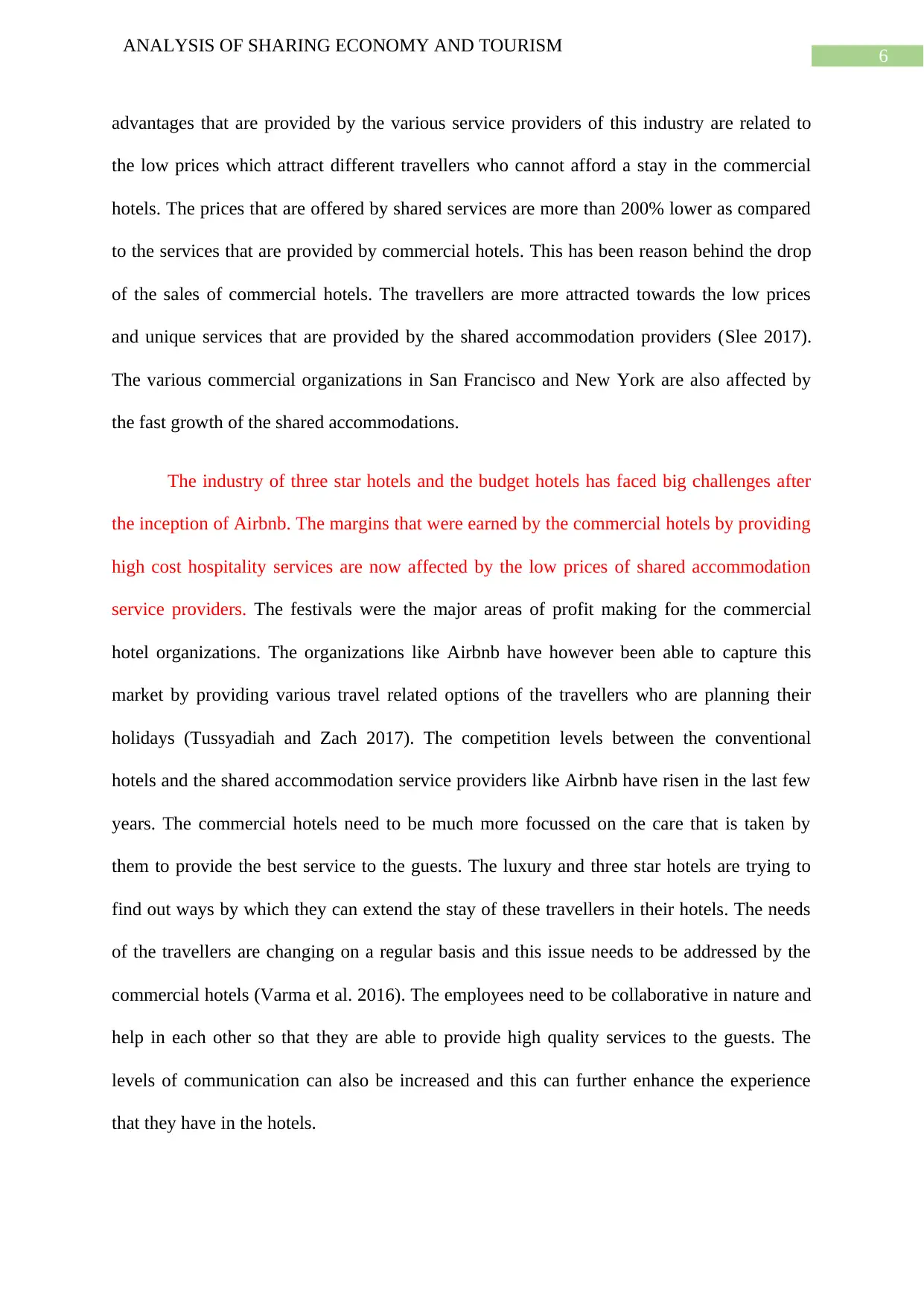
6
ANALYSIS OF SHARING ECONOMY AND TOURISM
advantages that are provided by the various service providers of this industry are related to
the low prices which attract different travellers who cannot afford a stay in the commercial
hotels. The prices that are offered by shared services are more than 200% lower as compared
to the services that are provided by commercial hotels. This has been reason behind the drop
of the sales of commercial hotels. The travellers are more attracted towards the low prices
and unique services that are provided by the shared accommodation providers (Slee 2017).
The various commercial organizations in San Francisco and New York are also affected by
the fast growth of the shared accommodations.
The industry of three star hotels and the budget hotels has faced big challenges after
the inception of Airbnb. The margins that were earned by the commercial hotels by providing
high cost hospitality services are now affected by the low prices of shared accommodation
service providers. The festivals were the major areas of profit making for the commercial
hotel organizations. The organizations like Airbnb have however been able to capture this
market by providing various travel related options of the travellers who are planning their
holidays (Tussyadiah and Zach 2017). The competition levels between the conventional
hotels and the shared accommodation service providers like Airbnb have risen in the last few
years. The commercial hotels need to be much more focussed on the care that is taken by
them to provide the best service to the guests. The luxury and three star hotels are trying to
find out ways by which they can extend the stay of these travellers in their hotels. The needs
of the travellers are changing on a regular basis and this issue needs to be addressed by the
commercial hotels (Varma et al. 2016). The employees need to be collaborative in nature and
help in each other so that they are able to provide high quality services to the guests. The
levels of communication can also be increased and this can further enhance the experience
that they have in the hotels.
ANALYSIS OF SHARING ECONOMY AND TOURISM
advantages that are provided by the various service providers of this industry are related to
the low prices which attract different travellers who cannot afford a stay in the commercial
hotels. The prices that are offered by shared services are more than 200% lower as compared
to the services that are provided by commercial hotels. This has been reason behind the drop
of the sales of commercial hotels. The travellers are more attracted towards the low prices
and unique services that are provided by the shared accommodation providers (Slee 2017).
The various commercial organizations in San Francisco and New York are also affected by
the fast growth of the shared accommodations.
The industry of three star hotels and the budget hotels has faced big challenges after
the inception of Airbnb. The margins that were earned by the commercial hotels by providing
high cost hospitality services are now affected by the low prices of shared accommodation
service providers. The festivals were the major areas of profit making for the commercial
hotel organizations. The organizations like Airbnb have however been able to capture this
market by providing various travel related options of the travellers who are planning their
holidays (Tussyadiah and Zach 2017). The competition levels between the conventional
hotels and the shared accommodation service providers like Airbnb have risen in the last few
years. The commercial hotels need to be much more focussed on the care that is taken by
them to provide the best service to the guests. The luxury and three star hotels are trying to
find out ways by which they can extend the stay of these travellers in their hotels. The needs
of the travellers are changing on a regular basis and this issue needs to be addressed by the
commercial hotels (Varma et al. 2016). The employees need to be collaborative in nature and
help in each other so that they are able to provide high quality services to the guests. The
levels of communication can also be increased and this can further enhance the experience
that they have in the hotels.
Paraphrase This Document
Need a fresh take? Get an instant paraphrase of this document with our AI Paraphraser
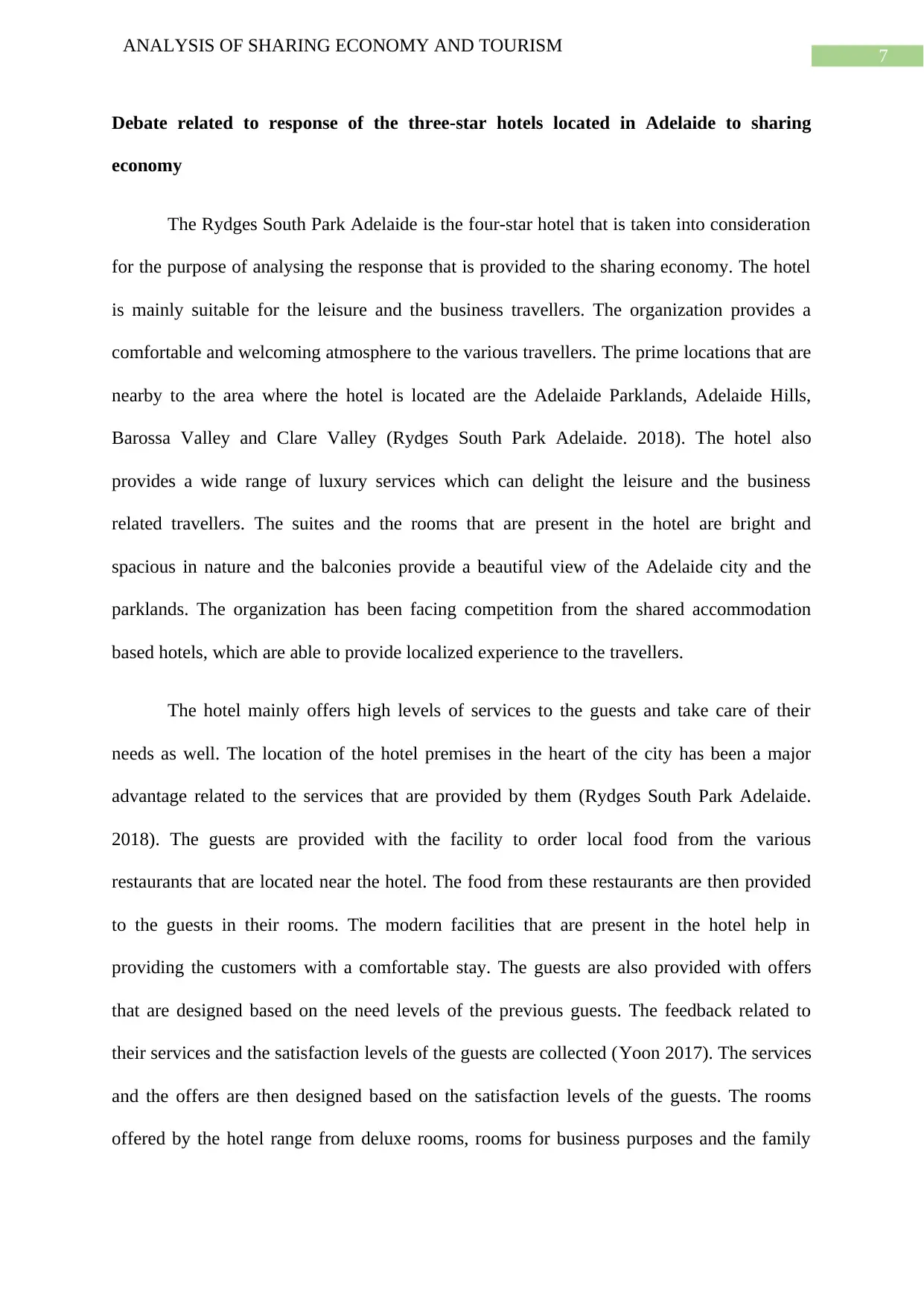
7
ANALYSIS OF SHARING ECONOMY AND TOURISM
Debate related to response of the three-star hotels located in Adelaide to sharing
economy
The Rydges South Park Adelaide is the four-star hotel that is taken into consideration
for the purpose of analysing the response that is provided to the sharing economy. The hotel
is mainly suitable for the leisure and the business travellers. The organization provides a
comfortable and welcoming atmosphere to the various travellers. The prime locations that are
nearby to the area where the hotel is located are the Adelaide Parklands, Adelaide Hills,
Barossa Valley and Clare Valley (Rydges South Park Adelaide. 2018). The hotel also
provides a wide range of luxury services which can delight the leisure and the business
related travellers. The suites and the rooms that are present in the hotel are bright and
spacious in nature and the balconies provide a beautiful view of the Adelaide city and the
parklands. The organization has been facing competition from the shared accommodation
based hotels, which are able to provide localized experience to the travellers.
The hotel mainly offers high levels of services to the guests and take care of their
needs as well. The location of the hotel premises in the heart of the city has been a major
advantage related to the services that are provided by them (Rydges South Park Adelaide.
2018). The guests are provided with the facility to order local food from the various
restaurants that are located near the hotel. The food from these restaurants are then provided
to the guests in their rooms. The modern facilities that are present in the hotel help in
providing the customers with a comfortable stay. The guests are also provided with offers
that are designed based on the need levels of the previous guests. The feedback related to
their services and the satisfaction levels of the guests are collected (Yoon 2017). The services
and the offers are then designed based on the satisfaction levels of the guests. The rooms
offered by the hotel range from deluxe rooms, rooms for business purposes and the family
ANALYSIS OF SHARING ECONOMY AND TOURISM
Debate related to response of the three-star hotels located in Adelaide to sharing
economy
The Rydges South Park Adelaide is the four-star hotel that is taken into consideration
for the purpose of analysing the response that is provided to the sharing economy. The hotel
is mainly suitable for the leisure and the business travellers. The organization provides a
comfortable and welcoming atmosphere to the various travellers. The prime locations that are
nearby to the area where the hotel is located are the Adelaide Parklands, Adelaide Hills,
Barossa Valley and Clare Valley (Rydges South Park Adelaide. 2018). The hotel also
provides a wide range of luxury services which can delight the leisure and the business
related travellers. The suites and the rooms that are present in the hotel are bright and
spacious in nature and the balconies provide a beautiful view of the Adelaide city and the
parklands. The organization has been facing competition from the shared accommodation
based hotels, which are able to provide localized experience to the travellers.
The hotel mainly offers high levels of services to the guests and take care of their
needs as well. The location of the hotel premises in the heart of the city has been a major
advantage related to the services that are provided by them (Rydges South Park Adelaide.
2018). The guests are provided with the facility to order local food from the various
restaurants that are located near the hotel. The food from these restaurants are then provided
to the guests in their rooms. The modern facilities that are present in the hotel help in
providing the customers with a comfortable stay. The guests are also provided with offers
that are designed based on the need levels of the previous guests. The feedback related to
their services and the satisfaction levels of the guests are collected (Yoon 2017). The services
and the offers are then designed based on the satisfaction levels of the guests. The rooms
offered by the hotel range from deluxe rooms, rooms for business purposes and the family
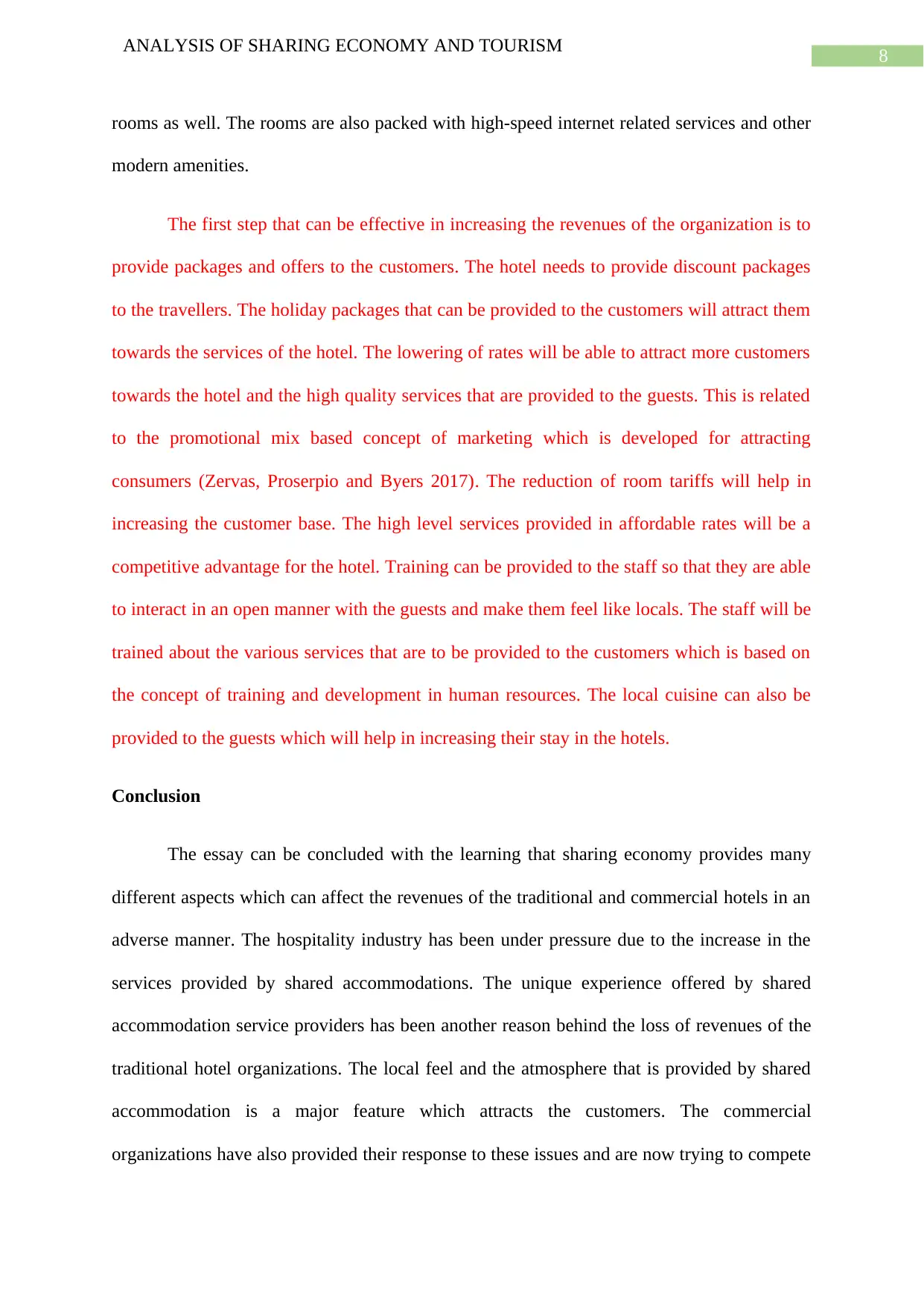
8
ANALYSIS OF SHARING ECONOMY AND TOURISM
rooms as well. The rooms are also packed with high-speed internet related services and other
modern amenities.
The first step that can be effective in increasing the revenues of the organization is to
provide packages and offers to the customers. The hotel needs to provide discount packages
to the travellers. The holiday packages that can be provided to the customers will attract them
towards the services of the hotel. The lowering of rates will be able to attract more customers
towards the hotel and the high quality services that are provided to the guests. This is related
to the promotional mix based concept of marketing which is developed for attracting
consumers (Zervas, Proserpio and Byers 2017). The reduction of room tariffs will help in
increasing the customer base. The high level services provided in affordable rates will be a
competitive advantage for the hotel. Training can be provided to the staff so that they are able
to interact in an open manner with the guests and make them feel like locals. The staff will be
trained about the various services that are to be provided to the customers which is based on
the concept of training and development in human resources. The local cuisine can also be
provided to the guests which will help in increasing their stay in the hotels.
Conclusion
The essay can be concluded with the learning that sharing economy provides many
different aspects which can affect the revenues of the traditional and commercial hotels in an
adverse manner. The hospitality industry has been under pressure due to the increase in the
services provided by shared accommodations. The unique experience offered by shared
accommodation service providers has been another reason behind the loss of revenues of the
traditional hotel organizations. The local feel and the atmosphere that is provided by shared
accommodation is a major feature which attracts the customers. The commercial
organizations have also provided their response to these issues and are now trying to compete
ANALYSIS OF SHARING ECONOMY AND TOURISM
rooms as well. The rooms are also packed with high-speed internet related services and other
modern amenities.
The first step that can be effective in increasing the revenues of the organization is to
provide packages and offers to the customers. The hotel needs to provide discount packages
to the travellers. The holiday packages that can be provided to the customers will attract them
towards the services of the hotel. The lowering of rates will be able to attract more customers
towards the hotel and the high quality services that are provided to the guests. This is related
to the promotional mix based concept of marketing which is developed for attracting
consumers (Zervas, Proserpio and Byers 2017). The reduction of room tariffs will help in
increasing the customer base. The high level services provided in affordable rates will be a
competitive advantage for the hotel. Training can be provided to the staff so that they are able
to interact in an open manner with the guests and make them feel like locals. The staff will be
trained about the various services that are to be provided to the customers which is based on
the concept of training and development in human resources. The local cuisine can also be
provided to the guests which will help in increasing their stay in the hotels.
Conclusion
The essay can be concluded with the learning that sharing economy provides many
different aspects which can affect the revenues of the traditional and commercial hotels in an
adverse manner. The hospitality industry has been under pressure due to the increase in the
services provided by shared accommodations. The unique experience offered by shared
accommodation service providers has been another reason behind the loss of revenues of the
traditional hotel organizations. The local feel and the atmosphere that is provided by shared
accommodation is a major feature which attracts the customers. The commercial
organizations have also provided their response to these issues and are now trying to compete
⊘ This is a preview!⊘
Do you want full access?
Subscribe today to unlock all pages.

Trusted by 1+ million students worldwide
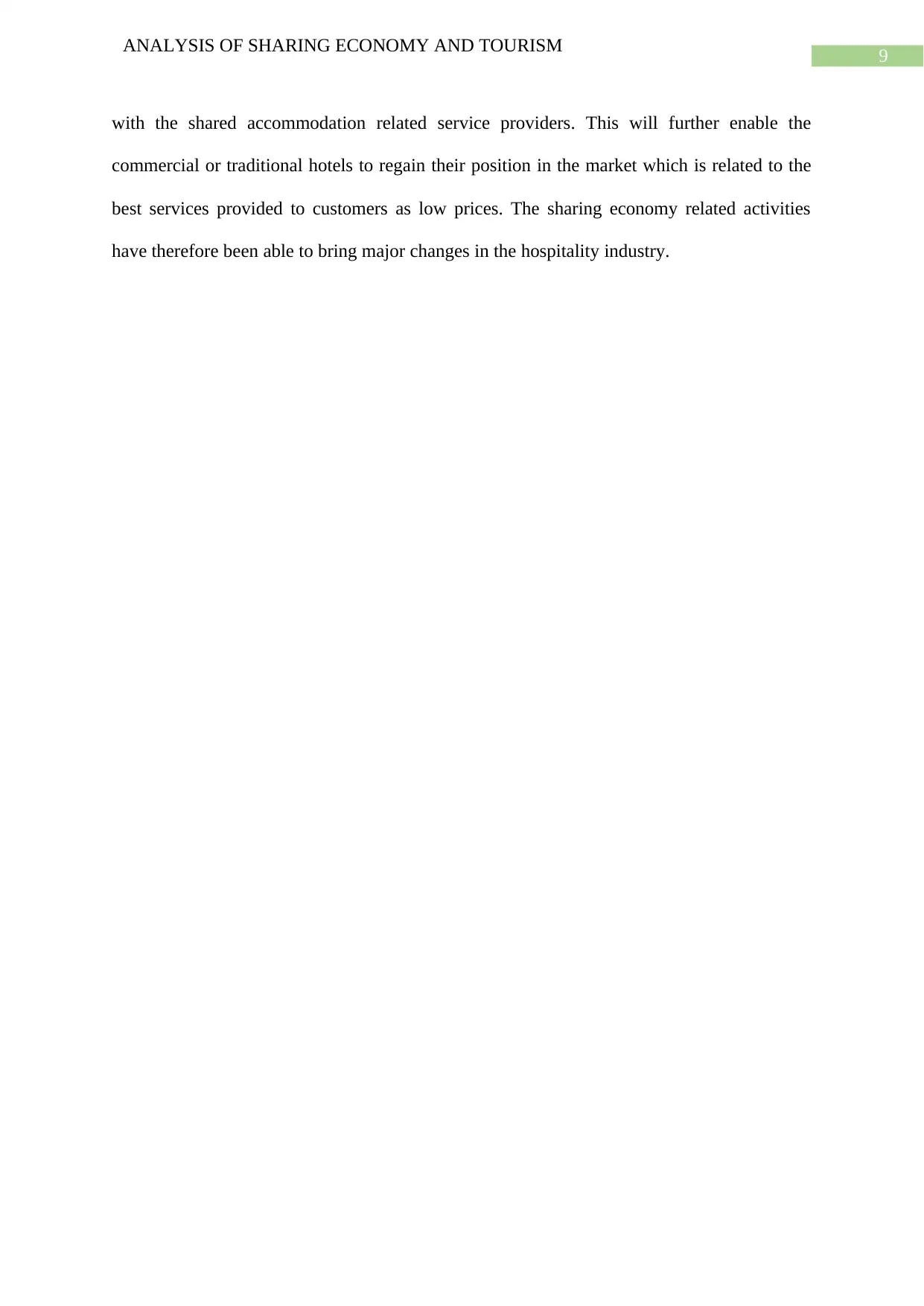
9
ANALYSIS OF SHARING ECONOMY AND TOURISM
with the shared accommodation related service providers. This will further enable the
commercial or traditional hotels to regain their position in the market which is related to the
best services provided to customers as low prices. The sharing economy related activities
have therefore been able to bring major changes in the hospitality industry.
ANALYSIS OF SHARING ECONOMY AND TOURISM
with the shared accommodation related service providers. This will further enable the
commercial or traditional hotels to regain their position in the market which is related to the
best services provided to customers as low prices. The sharing economy related activities
have therefore been able to bring major changes in the hospitality industry.
Paraphrase This Document
Need a fresh take? Get an instant paraphrase of this document with our AI Paraphraser
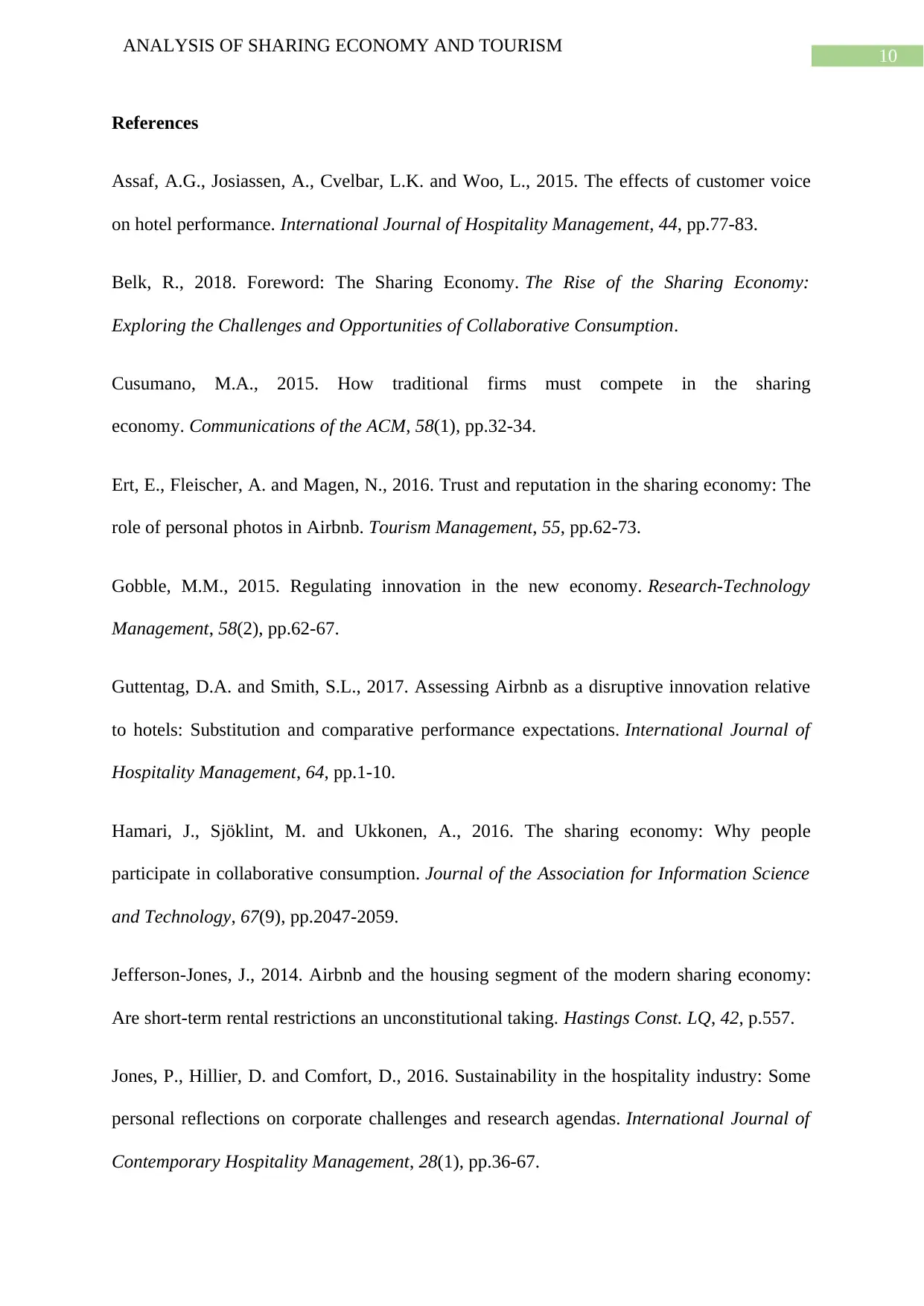
10
ANALYSIS OF SHARING ECONOMY AND TOURISM
References
Assaf, A.G., Josiassen, A., Cvelbar, L.K. and Woo, L., 2015. The effects of customer voice
on hotel performance. International Journal of Hospitality Management, 44, pp.77-83.
Belk, R., 2018. Foreword: The Sharing Economy. The Rise of the Sharing Economy:
Exploring the Challenges and Opportunities of Collaborative Consumption.
Cusumano, M.A., 2015. How traditional firms must compete in the sharing
economy. Communications of the ACM, 58(1), pp.32-34.
Ert, E., Fleischer, A. and Magen, N., 2016. Trust and reputation in the sharing economy: The
role of personal photos in Airbnb. Tourism Management, 55, pp.62-73.
Gobble, M.M., 2015. Regulating innovation in the new economy. Research-Technology
Management, 58(2), pp.62-67.
Guttentag, D.A. and Smith, S.L., 2017. Assessing Airbnb as a disruptive innovation relative
to hotels: Substitution and comparative performance expectations. International Journal of
Hospitality Management, 64, pp.1-10.
Hamari, J., Sjöklint, M. and Ukkonen, A., 2016. The sharing economy: Why people
participate in collaborative consumption. Journal of the Association for Information Science
and Technology, 67(9), pp.2047-2059.
Jefferson-Jones, J., 2014. Airbnb and the housing segment of the modern sharing economy:
Are short-term rental restrictions an unconstitutional taking. Hastings Const. LQ, 42, p.557.
Jones, P., Hillier, D. and Comfort, D., 2016. Sustainability in the hospitality industry: Some
personal reflections on corporate challenges and research agendas. International Journal of
Contemporary Hospitality Management, 28(1), pp.36-67.
ANALYSIS OF SHARING ECONOMY AND TOURISM
References
Assaf, A.G., Josiassen, A., Cvelbar, L.K. and Woo, L., 2015. The effects of customer voice
on hotel performance. International Journal of Hospitality Management, 44, pp.77-83.
Belk, R., 2018. Foreword: The Sharing Economy. The Rise of the Sharing Economy:
Exploring the Challenges and Opportunities of Collaborative Consumption.
Cusumano, M.A., 2015. How traditional firms must compete in the sharing
economy. Communications of the ACM, 58(1), pp.32-34.
Ert, E., Fleischer, A. and Magen, N., 2016. Trust and reputation in the sharing economy: The
role of personal photos in Airbnb. Tourism Management, 55, pp.62-73.
Gobble, M.M., 2015. Regulating innovation in the new economy. Research-Technology
Management, 58(2), pp.62-67.
Guttentag, D.A. and Smith, S.L., 2017. Assessing Airbnb as a disruptive innovation relative
to hotels: Substitution and comparative performance expectations. International Journal of
Hospitality Management, 64, pp.1-10.
Hamari, J., Sjöklint, M. and Ukkonen, A., 2016. The sharing economy: Why people
participate in collaborative consumption. Journal of the Association for Information Science
and Technology, 67(9), pp.2047-2059.
Jefferson-Jones, J., 2014. Airbnb and the housing segment of the modern sharing economy:
Are short-term rental restrictions an unconstitutional taking. Hastings Const. LQ, 42, p.557.
Jones, P., Hillier, D. and Comfort, D., 2016. Sustainability in the hospitality industry: Some
personal reflections on corporate challenges and research agendas. International Journal of
Contemporary Hospitality Management, 28(1), pp.36-67.
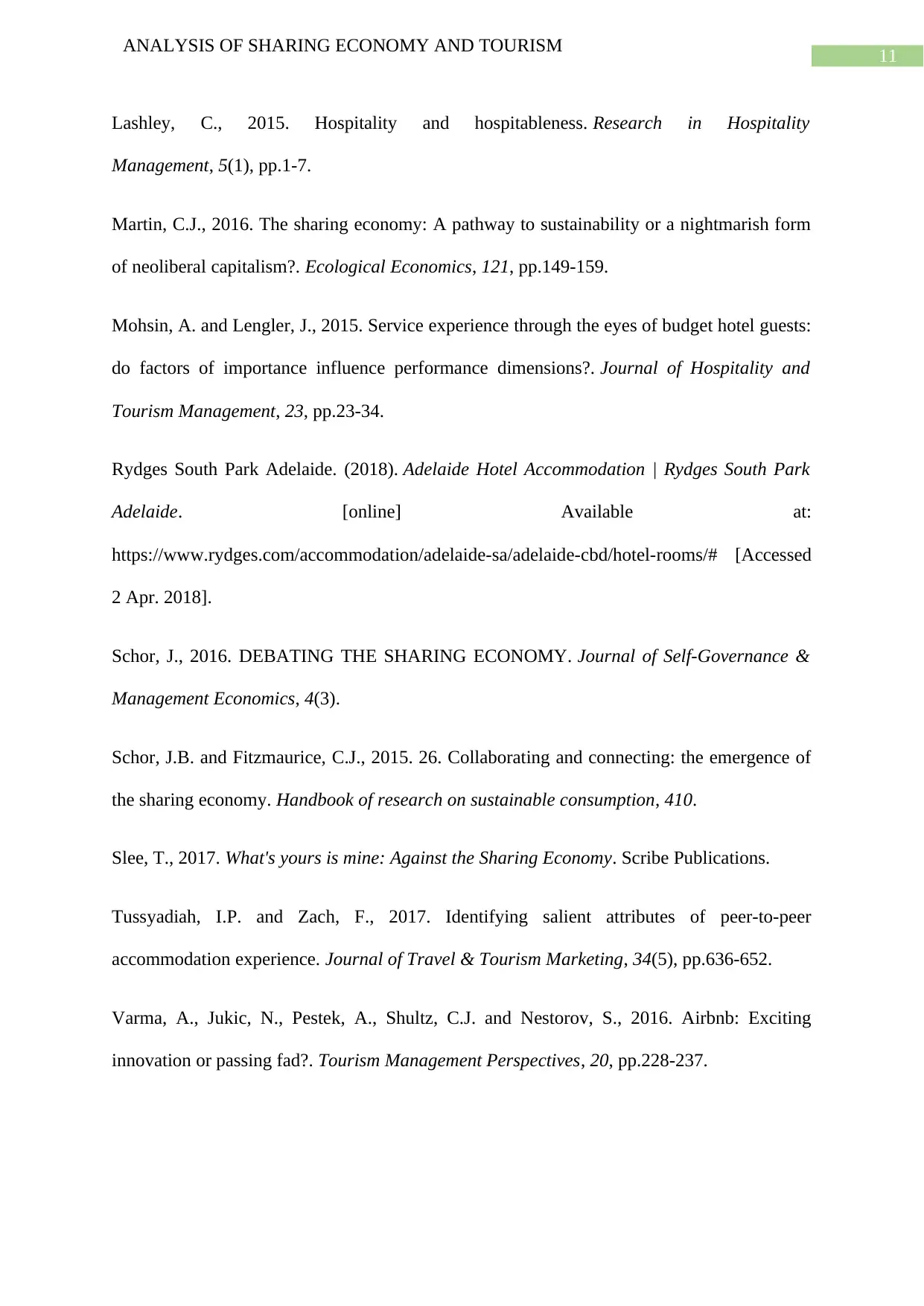
11
ANALYSIS OF SHARING ECONOMY AND TOURISM
Lashley, C., 2015. Hospitality and hospitableness. Research in Hospitality
Management, 5(1), pp.1-7.
Martin, C.J., 2016. The sharing economy: A pathway to sustainability or a nightmarish form
of neoliberal capitalism?. Ecological Economics, 121, pp.149-159.
Mohsin, A. and Lengler, J., 2015. Service experience through the eyes of budget hotel guests:
do factors of importance influence performance dimensions?. Journal of Hospitality and
Tourism Management, 23, pp.23-34.
Rydges South Park Adelaide. (2018). Adelaide Hotel Accommodation | Rydges South Park
Adelaide. [online] Available at:
https://www.rydges.com/accommodation/adelaide-sa/adelaide-cbd/hotel-rooms/# [Accessed
2 Apr. 2018].
Schor, J., 2016. DEBATING THE SHARING ECONOMY. Journal of Self-Governance &
Management Economics, 4(3).
Schor, J.B. and Fitzmaurice, C.J., 2015. 26. Collaborating and connecting: the emergence of
the sharing economy. Handbook of research on sustainable consumption, 410.
Slee, T., 2017. What's yours is mine: Against the Sharing Economy. Scribe Publications.
Tussyadiah, I.P. and Zach, F., 2017. Identifying salient attributes of peer-to-peer
accommodation experience. Journal of Travel & Tourism Marketing, 34(5), pp.636-652.
Varma, A., Jukic, N., Pestek, A., Shultz, C.J. and Nestorov, S., 2016. Airbnb: Exciting
innovation or passing fad?. Tourism Management Perspectives, 20, pp.228-237.
ANALYSIS OF SHARING ECONOMY AND TOURISM
Lashley, C., 2015. Hospitality and hospitableness. Research in Hospitality
Management, 5(1), pp.1-7.
Martin, C.J., 2016. The sharing economy: A pathway to sustainability or a nightmarish form
of neoliberal capitalism?. Ecological Economics, 121, pp.149-159.
Mohsin, A. and Lengler, J., 2015. Service experience through the eyes of budget hotel guests:
do factors of importance influence performance dimensions?. Journal of Hospitality and
Tourism Management, 23, pp.23-34.
Rydges South Park Adelaide. (2018). Adelaide Hotel Accommodation | Rydges South Park
Adelaide. [online] Available at:
https://www.rydges.com/accommodation/adelaide-sa/adelaide-cbd/hotel-rooms/# [Accessed
2 Apr. 2018].
Schor, J., 2016. DEBATING THE SHARING ECONOMY. Journal of Self-Governance &
Management Economics, 4(3).
Schor, J.B. and Fitzmaurice, C.J., 2015. 26. Collaborating and connecting: the emergence of
the sharing economy. Handbook of research on sustainable consumption, 410.
Slee, T., 2017. What's yours is mine: Against the Sharing Economy. Scribe Publications.
Tussyadiah, I.P. and Zach, F., 2017. Identifying salient attributes of peer-to-peer
accommodation experience. Journal of Travel & Tourism Marketing, 34(5), pp.636-652.
Varma, A., Jukic, N., Pestek, A., Shultz, C.J. and Nestorov, S., 2016. Airbnb: Exciting
innovation or passing fad?. Tourism Management Perspectives, 20, pp.228-237.
⊘ This is a preview!⊘
Do you want full access?
Subscribe today to unlock all pages.

Trusted by 1+ million students worldwide
1 out of 13
Related Documents
Your All-in-One AI-Powered Toolkit for Academic Success.
+13062052269
info@desklib.com
Available 24*7 on WhatsApp / Email
![[object Object]](/_next/static/media/star-bottom.7253800d.svg)
Unlock your academic potential
Copyright © 2020–2026 A2Z Services. All Rights Reserved. Developed and managed by ZUCOL.




